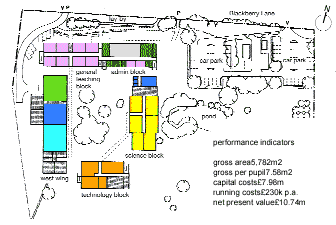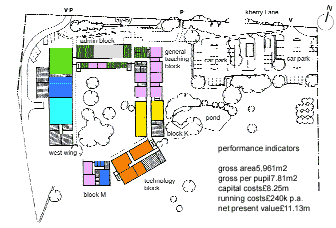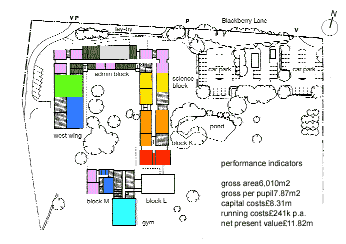|
The feasibility
study should look at all the options and appraise them properly.
This will usually involve considering 'do nothing', and 'do minimum'
options as a basis for comparison. It is important that the option
appraisals look at not just the initial capital cost of building,
but also the likely lifetime costs, as the maintenance and running
costs of a building over its life are far greater than its initial
capital cost. Lifetime costs for each option are adjusted using
a standard discount rate, currently 6%, and then added together
to give the net present value. This process enables costs occurring
at different times to be expressed on a common basis. Option appraisal
should also cover qualitative aspects, such as the contribution
that buildings make towards raising educational standards, providing
community facilities, design quality etc. Illustrative examples
of appraisals of project options and their costs are shown in the
plans of the secondary school (left). The DfES issues annual guidance on how to obtain funding for new capital projects. Schools and the LEA will need to decide which is the best approach. HM Treasury’s Green Book provides guidance on appraisal principles and the DfES will shortly be publishing guidance on option appraisal in relation to school building projects. 3.5 COST PLANNING Costs of both new school building and refurbishment work are currently rising faster than general inflation. This is due to the present heavy national demand for building work coming up against skill shortages in the building industry, and to the increased complexity of school building and more stringent construction regulations. Schools with a number of community facilities will usually cost more, and LEAs need to bring together funding streams from various sources in a joined-up way to finance such schemes. A sustainable, good quality building with low maintenance requirements may cost more initially, but this should be more than offset by lower running costs. So it is important that the lifetime cost of the design is considered rather than just the initial capital cost (see Section 3.4). |
||||||
|


